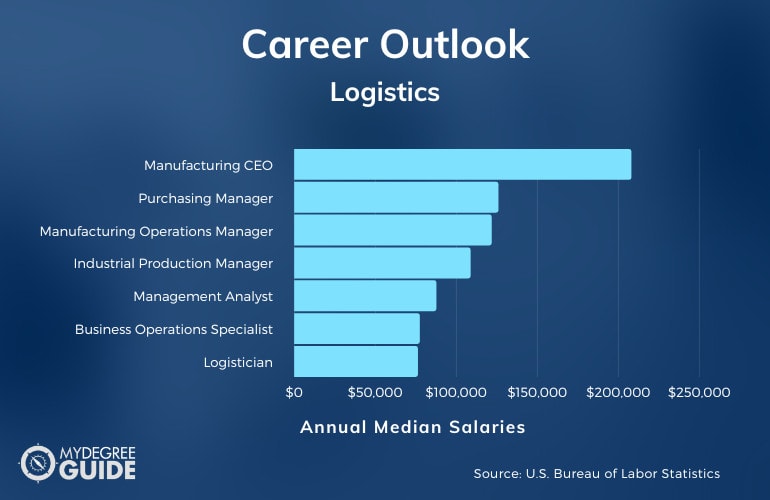If you’re interested in overseeing a business’s flow of goods, from production through delivery to end consumers, then an online logistics degree may be a good fit for you.

A career in logistics may provide you with the opportunity to work within globalized business operations for both small and large businesses across various sectors of the economy.
Editorial Listing ShortCode:
In addition to high annual salaries, careers in logistics may provide flexibility in career trajectory as your goals change over time. Following entry-level experience, you may be able to pursue advanced positions in management and leadership.
Universities Offering Online Bachelor’s in Logistics Degree Programs
Methodology: The following school list is in alphabetical order. To be included, a college or university must be regionally accredited and offer degree programs online or in a hybrid format.
1. Anderson University
Anderson University offers an undergraduate business administration degree with three different concentration tracks in supply chain management, operations management, and logistics and distribution.
Students in the logistics and distribution concentration track learn about the different shipping methods used in moving goods and about warehousing and product distribution.
Anderson University is accredited by the Southern Association of Colleges and Schools Commission on Colleges.
2. American Public University
The Bachelor of Arts in Transportation and Logistics Management program from American Public University teaches students about policies, issues, and trends related to transportation and logistics.
Students also come to understand why planning and monitoring are so crucial to successful deliveries. Other topics include reverse logistics, ground transportation, and finance.
APUS is accredited by the Higher Learning Commission.
3. Arizona State University
Students in Arizona State University’s Bachelor of Arts in Business program can select the Global Logistics Management concentration to learn about supply chain and logistics management.
There are 41 total courses in the program, including applied logistics management, analytics for logistics, procurement of services, global supply operations, and business sustainability.
Arizona State University is accredited by the Higher Learning Commission of the North Central Association of Schools and Colleges.
4. Ball State University
Ball State University has a 120 credit bachelors program in logistics and supply chain management for students hoping to pursue careers in logistics, distribution, procurement, inventory services, transportation solutions, or quality control.
Some required courses include simulation, modeling and optimization, information technology, and business analytics as well as an immersive industry internship.
Ball State University is accredited by the Higher Learning Commission.
5. Bellevue University
The 127 credit Bachelor of Science in Supply Chain, Transportation, and Logistics Management program at Bellevue University focuses on the fields of inventory management, global logistics management, procurement, warehousing, and transportation and information systems and planning.
The required courses in the curriculum help students prepare to earn various ASCM certifications.
Bellevue University is accredited by the Higher Learning Commission.
6. California Baptist University
California Baptist University features a business administration bachelors program with a concentration in logistics and operations.
Students learn the fundamentals of logistics and supply chain management through courses discussing allocating materials, supplies, and products, identifying and solving real-world business problems and minimizing the time and money required to transport goods.
California Baptist University is accredited by the Western Association of Schools and Colleges Senior College and University Commission.
7. East Carolina University
East Carolina University’s Bachelor of Science in Industrial Distribution and Logistics program teaches students about every step in the supply chain, beginning with raw materials and ending with final delivery.
It teaches them about coordinating the movement of goods both domestically and globally. Courses include warehousing, transportation, purchasing, and pricing.
East Carolina University is accredited by the Commission on Colleges of the Southern Association of Colleges and Schools.
8. Florida International University
Logistics and Supply Chain Management is one of the available concentrations of Florida International University’s Bachelor of Business Administration degree.
The program requires 120 credits for completion and teaches students about improving customers’ experiences, effectively reducing inventory, and enhancing profitability. The program is financial aid-eligible, and scholarships are also available to students who qualify.
Florida International University is accredited by the Southern Association of Colleges and Schools Commission on Colleges.
9. Florida State College at Jacksonville
At Florida State College at Jacksonville, students in the Bachelor of Applied Science in Logistics can finish the program in only 20 months with the accelerated degree option. The program is ACBSP accredited. Graduates should be ready for the workforce.
FSCJ is accredited by the Southern Association of Colleges and Schools Commission on Colleges.
10. Franklin University
The Bachelor of Science in Logistics Management program at Franklin University is a 124 credit program. There are 28 credits in major, foundational courses, and there are 20 more credits in logistics-specific courses. These include classes like supply chain management, business modeling, purchasing and inventory management, and the logistics capstone.
Franklin University is accredited by the Higher Learning Commission.
11. Lindenwood University
Lindenwood University offers both Bachelor of Arts and Bachelor of Science in Business Administration degrees, and both feature concentrations in Supply Chain Management. To pursue this concentration, students must dedicate at least 12 credit hours of their 21 hours of electives into the fields of supply chain management and logistics.
Lindenwood University is accredited by the Higher Learning Commission.
12. Minnesota State University – Moorhead
Minnesota State University – Moorhead offers a Bachelors in Operations Management degree, which is very closely related to logistics and supply chain management.
The program can be completed online and features flexible scheduling options and accelerated delivery. Students can even participate in on-the-job learning via internships set up by program administrators.
Minnesota State University Moorhead is accredited by the Higher Learning Commission.
13. Murray State University
Murray State University’s business bachelors program features a concentration in logistics and supply chain management.
The degree requires 47 credits at the junior and senior levels in addition to the initial credits required for students to have earned their associates degrees. Courses include business statistics, ethics, logistics management, and organizational behavior.
Murray State University is accredited by the Southern Association of Colleges and Schools Commission on Colleges.
14. Northern Arizona University
The Bachelor of Applied Science in Logistics and Supply Chain Management program from Northern Arizona University is ACBSP accredited and focuses heavily on technology, virtual and in-person teamwork and collaboration, and communication.
Students take courses on strategic logistics, logistics network analysis and design, global logistics, sustainable logistics, and various elective courses.
Northern Arizona University is accredited by The Higher Learning Commission.
15. Northern Kentucky University
Northern Kentucky University’s Bachelors in Business Administration program with a concentration in Global Supply Chain Management is a good program for students hoping to become buyers, purchasing managers, distribution managers, or logistics managers.
The program is AACSB accredited and includes courses like logistics and distribution, global strategic sourcing, and supply chain management.
Northern Kentucky University is accredited by the Southern Association of Colleges and Schools Commission on Colleges.
16. Ohio Christian University
Graduates of Ohio Christian University’s Bachelor of Arts in Business program should be able to assess business decisions through a Christian perspective, evaluate business operations to find room for improvement, and evaluate decisions made by global business leaders.
Courses cover such topics as finance, business law, management, IT, and logistics.
Ohio Christian University is accredited by the Higher Learning Commission of the North Central Association of Colleges and Schools.
17. Park University
Park University’s logistics and management bachelors program is ACBSP accredited and requires 120 credits to graduate. Of those, 66 must be a mixture of degree-specific core courses and approved electives.
Some of these courses include international business perspectives, principles of financial accounting, applied computer technology for business, and management and organizational behavior.
Park University is accredited by the Higher Learning Commission.
18. Portland State University
Portland State University’s supply and logistics management bachelors program is one of only three programs of its kind in the entire nation to be certified by the Institute for Supply Management. Students will gain strategic and technical skills in distributing products, procuring resources, and undertaking global supply chain management.
Portland State University is accredited by the Northwest Commission on Colleges and Universities.
19. Saint Leo University
The Bachelor of Arts in Business Administration program at Saint Leo University features Logistics as an optional concentration.
The curriculum includes a wealth of logistics-related courses, including introduction to logistics management, transportation and distribution management, procurement, purchasing and vendor management, and quality improvement and management. Students also develop logistics portfolios.
Saint Leo University is accredited by the Southern Association of Colleges and Schools Commission on Colleges.
20. Southern New Hampshire University
Students enrolled in Southern New Hampshire University’s Bachelor of Science in Operations Management program can receive credit for prior learning and should be prepared to take the CAPM examination after graduation.
There’s an optional Logistics and Transportation concentration that will teach students about transportation management, reverse logistics, and sustainable operations.
Southern New Hampshire University is accredited by the New England Commission of Higher Education.
21. Southern Wesleyan University
Southern Wesleyan University’s Bachelor of Science in Business Administration program allows students to customize their degrees by selecting one of seven concentrations, including a concentration in Supply Chain Management.
Students in this concentration should become sourcing and logistics experts by graduation. Courses include business law, finance, management, and marketing.
Southern Wesleyan University is accredited by the Southern Association of Colleges and Schools Commission on Colleges.
22. Temple University
Temple University offers a Bachelor of Business Administration in Supply Chain Management degree through its Fox School of Business.
The curriculum consists of coursework, lectures, seminars, and even career fairs. Students learn to leverage worldwide logistics, measure global performance, synchronize supply with demand, create net value, and build competitive infrastructure.
Temple University is accredited by the Middle States Commission on Higher Education.
23. Trident University
Students in Trident University’s Bachelor of Science in Business Administration program can earn their degrees, along with a Logistics concentration, completely online.
Graduates should be fully prepared for careers in global logistics management, operations management control, supply chain management, and other closely related fields. Financial aid and scholarships are available to students who qualify.
Trident University is accredited by the Western Association of Schools and Colleges, Senior Colleges and University Commission.
24. University of Southern Mississippi
University of Southern Mississippi’s Bachelor of Science in Industrial Engineering Technology Logistics program requires 120 credits to complete and can usually be finished in 2 to 4 years.
The degree is ABET accredited and requires 45 credits of major-specific courses. These include courses in digital graphics, engineering economics, and industrial automation.
The University of Southern Mississippi is accredited by the Southern Association of Colleges and Schools Commission on Colleges.
25. Western Illinois University
The Bachelor of Business in Supply Chain Management at Western Illinois University is part of an integrated program that allows interested students to earn both their bachelors and masters degrees within 5 years. The program is AACSB accredited and provides students with lots of networking experience and exposure to industry contacts.
Western Illinois University is accredited by the Higher Learning Commission.
Online Logistics Degrees

Earning your logistics bachelors degree online may allow you to oversee supply chain management on a local, national, or global scale. You may also work across various sectors of the economy in small businesses, corporations, and government organizations.
Logistics is generally about getting products from businesses to consumers and managing the flow of goods and services. Specific job requirements of different positions will of course vary from one employer to the next.
With an online degree in supply chain management and logistics, you may be responsible for the delivery of goods and the oversight of transportation details and inventory levels. You may also make buying or purchasing decisions for a business, or you may manage a warehouse and inventory levels of various products.
Other responsibilities may include ensuring high product quality—from raw materials through final product development—and monitoring compliance with local, state, federal, and international laws. You may also evaluate transportation performance and risks.
The coursework required to complete a logistics degree may include courses related to inventory management, global logistics, project management, supply chain management principles, modeling and optimization, business analytics, and quality management.
A bachelor’s degree is the entry-level educational requirement for most logistics careers. This includes the positions of logistics manager, distribution manager, inventory planner, quality control analyst, and transportation solutions analyst.
Logistics Careers & Salaries

With your degree in logistics online, you may have the opportunity to work in a number of different industries. You may join the field of logistics, operations, supply chain management, transportation logistics, and quality control.
There are positions across virtually every sector of the economy. Careers exist in government, manufacturing, specialty firms, transportation, small businesses, and corporations.
Pursuing a career in logistics and supply chain management may allow you to oversee the entire product development process for a business. This process covers everything from purchasing raw materials to quality management and product storage.
In addition to managing the entire product life cycle, you may be responsible for maintaining relationships with vendors and suppliers.
According to the Bureau of Labor Statistics, there are a number of lucrative career options you may pursue with a degree in logistics.
| Careers | Annual Median Salaries |
| Manufacturing CEO | $208,000 |
| Purchasing Manager | $125,940 |
| Manufacturing Operations Manager | $121,800 |
| Industrial Production Manager | $108,790 |
| Management Analyst | $87,660 |
| Business Operations Specialist | $77,420 |
| Logistician | $76,270 |
| Buyer or Purchasing Agent | $66,690 |
| Cost Estimator | $66,610 |
| Quality Control Inspector | $40,460 |
A logistics and transportation degree may also allow you to have transportation-specific responsibilities, such as managing the movement of products. This process may include everything from transporting raw materials and product parts to releasing and transporting the final product to consumers.
Handling the transportation aspect of the product cycle requires an understanding of importing and exporting regulations. You may plan for storage, packaging, warehousing, and final transportation.
Depending on your position, quality control may fall under your purview as well. This could involve inspecting and testing products for defects, identifying areas or ways to improve production efficiency, and maintaining accurate records. You may also alert management to issues in product quality.
According to the Bureau of Labor Statistics, a number of careers in the field of logistics and supply chain management are predicted to experience positive job growth for the next ten years. Some of these positions include purchasing managers (3%), logisticians (4%), top executives (4%), business operations specialists (6%), operations managers (6%), and management analysts (11%).
However, some of the most lucrative jobs in this field may require a higher level degree like an online PhD in supply chain management.
Logistics Curriculum & Courses

A logistics and supply chain management degree online program will include a number of general curriculum courses in addition to coursework that is specific to your major.
Some major-specific courses and electives may include the following:
- Inventory and Warehouse Management: You’ll discover strategies for managing physical inventory and developing forecast inventory models.
- Global Logistics and Transportation Management: This course examines supply management strategies in a global context, including multi-modal transportation operations, vendor and consumer relations, and regulatory practices.
- Project Management: You’ll learn key principles of project management, including cost oversight, time management, and quality control, and you’ll gain practical experience using project management software.
- Operations and Supply Chain Management: This course is an introduction to supply chain management principles and common issues related to logistics, operations, and transportation of goods.
- Modeling and Optimization: You’ll apply computer modeling simulations to practical logistics and transportation operations, and you’ll learn methods to optimize practices and improve efficiencies within a business.
- Business Analytics: You’ll learn methods to analyze logistics and supply chain data to identify patterns and improve decision making.
- Quality Management and Lean Six Sigma: This course covers quality control and assurance practices for businesses through the use of cost principles and statistical methods.
- Management Principles: You’ll learn about key management principles in relation to managing teams, planning and organizing work, and improving efficiency.
- Procurement, Logistics, and Supply Chain Design: This course examines the relationship between various components of the supply chain management process to ensure efficiency in the transfer of information and products.
- Business Ethics: This course explores the role of ethical decision making in business, both in a global corporate context and in relation to social, economic, and political implications.
Depending on the program, you may take coursework that allows you to concentrate more specifically in various areas or industries in the field. These concentrations include logistics, supply chain management, operations, transportation logistics, and quality control.
Admissions Requirements

Admission requirements vary from school to school. They may also differ depending on whether you have previously attended a postsecondary institution or are applying as an international student.
- High school transcripts: Generally, programs will require you to submit high school transcripts as well as your cumulative GPA as part of your admission package.
- SAT or ACT scores (if required): While not always required, some schools may request your SAT or ACT scores and have a minimum score threshold for admission.
- Postsecondary transcripts: To transfer credits from previous coursework, schools may request transcripts and your GPA from any previous postsecondary studies.
For international students, some schools may require proof of English proficiency prior to acceptance into an online logistics degree program.
Accreditation

Regional accreditation regulates the academic quality of a program’s curriculum, and it may be a factor to consider when deciding which online logistics degree program to attend.
If you are interested in transferring credits from previous postsecondary studies, then the accreditation status of your previous program may matter as well. Employers often respect and recognize degrees with positive accreditation status, and it may factor into their hiring decisions.
You can find out more information about the accreditation status of programs you’re interested in attending through the website of the US Department of Education.
Financial Aid and Scholarships

In your pursuit to obtain a degree in logistics online, you may be eligible to receive various forms of financial aid, including federal or state aid in the form of grants or loans. You may also qualify to receive either general scholarship funding or scholarships specifically available for logistics and supply chain management students.
Some employers even offer training programs or funding to support existing employees in pursuing continuing education. You may apply for financial aid by filling out the Free Application for Federal Student Aid online.
What Is a Logistics Degree?

Depending on the school you choose to attend, logistics management degrees may be offered as a Bachelor of Business Administration, a Bachelor of Arts, or a Bachelor of Science. There may be a number of program concentrations available depending on the school.
Some concentrations include operations and supply chain management, supply chain and logistics management, operations management, supply chain logistics, transportation and logistics management, and total quality management.
What Can You Do with a Logistics Degree?
With a logistics degree, you may be qualified for positions across various sectors of the economy. Positions range from entry-level to management and top-level executive.
Entry-level positions include logistician, buyer or purchasing agent, business operations specialist, cost estimator, and quality control inspector. Examples of management and executive positions include chief operations officer, chief logistics officer, purchasing manager, operations manager, or quality assurance manager.
What Degree Is Best for Logistics?

A bachelor’s degree is a common entry-level educational requirement for careers in logistics. Such degrees may be available as a bachelors in business administration, in arts, or in science, depending on the school and program.
Within the field of logistics, there are a number of different avenues that you may choose to pursue, including logistics, operations, supply chain management, transportation, and quality control.
The degree that is best for you is often the one that closely matches your personal interests, career goals, and general preferences.
How Long Does It Take to Get a Transportation and Logistics Degree Online?

If you follow a traditional schedule of 16 week semesters and are a full-time student, it may take you 4 years to obtain a transportation and logistics degree. Do you need the fastest bachelor degree option so you can graduate sooner? Programs that offer 8 week semesters with continual enrollment throughout the year may be completed in less time.
Some schools may offer part-time enrollment options, which would allow you to take a reduced course load. This option may allow you to balance other demands, such as work and family life, but it will often take you longer to complete your degree.
If you would prefer to take a shorter route, then an associates degree in logistics online may be the best choice for you to get your foot in the door.
Is a Logistics Degree Worth It?
Yes, a logistics degree is worth it for many students. The Bureau of Labor Statistics is projecting 5% job growth in business and financial occupations over the next 10 years.
Common logistics careers in this field include chief logistics officer, purchasing manager, logistician, buyer, cost estimator, and quality control inspector.
Within the field of logistics, there is significant room for growth. With experience, you may have the opportunity to advance from an entry-level position into management and leadership positions.
Getting Your Logistics Degree Online

Getting your accredited logistics degree online may offer a high return on investment. In the field of logistics, you may have a higher than average annual salary, a positive job outlook, and room for career advancement to management and leadership positions.
After earning your degree, you may be prepared to manage supply chain projects, use data to improve decision making, and forecast inventory needs. You may even develop more efficient methods of handling issues in logistics, supply chain management, quality control, and transportation.
With a career in logistics, you may support the flow of goods from businesses to consumers and work in regional, national, and global markets for small businesses or large corporations.
If this career field seems to align with your goals and interests, then you may want to consider an accredited degree in logistics as the next step in your educational journey.
